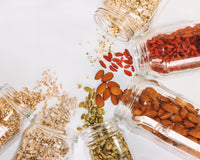Food and Longevity
As we climb further and further along the path of adulthood, our health becomes more of a worry. Classic conversations with doctors, at the annual check-ups, talk about lowering your blood pressure and your cholesterol; they talk about how you need more sleep and could probably do with exercising more.
As we are getting older, the more realistic and rational our perspective becomes. We realise that we are not these immortal beings we thought we were, and suddenly the decisions we make effect our current lives and our future lives.
With this being said, making new habits and making changes does not have to be hard or scary. It can be fulfilling and interesting. So, let’s give it a go! Here is our best advice on what healthy foods you can eat to help you live longer.
Fruits and Vegetables
Now you can roll your eyes when you read this… But an apple a day does keep the doctor away. And… you should be eating five pieces of vegetables or fruit a day. These wholefoods are packed with vitamins and minerals that work to help your body function. Supporting your weight, muscles, energy, and especially your digestive system. As a whole, fruit and veg include far less saturated fats and cholesterol, which you only need in small doses to maintain a healthy diet.
Not only do they help with your body as it currents stands, but fruit and vegetables also help your future frame. These foods help prevent lots of health risks because of how nutrient-dense they are. Some of the risks they help prevent include- cardiovascular problems, cognitive problems, blood pressure issues, diabetes, and even some types of cancers.
To indulge these foods, you can conveniently eat them raw and cooked, to get the vitamins and minerals into your body. Some of the best wholefoods (that have high antioxidant potential, fibre, potassium and low saturated fat) to incorporate in your diet are bananas, cherries, avocados, raspberries, leafy greens, sweet potatoes, and red peppers.
Whole Grains and Dried Whole Food
Alongside fruits and vegetables, whole-grain foods are crucial for adding nutrients to your body. They add a great amount of fibre to your diet and can be useful for controlling your cholesterol and blood pressure levels. Accessibly, whole-grain products come in lots of different food types and even have gluten-free options. For example:
Quinoa (Super source of protein- works with casseroles, stews, porridges, pastas, and salads)
Barley (Great for thickening soups and adding extra texture to salads)
Oats (Tasty breakfast or dessert option- very versatile to cook and a very fulfilling meal)
Legumes (Diverse protein and fibre option, can add to most savoury meals)
Amaranth (Gluten-free whole grain- similar to an oats and quinoa texture)
Buckwheat (Gluten-free whole grain- cooked in pancakes, granola, and noodles)
Teff (Gluten-free whole grain- highest protein option, great way to make flatbreads)
Nuts/Nut Butter
Seeds and nuts are completely packed with health advantages. Filled with plenty of micronutrients, nuts are a really easy option for getting whole foods into your diet. They are a great snack that you can have a handful of and not worry about having to cook.
Organic nuts come in plenty of sizes, shapes and flavours so you also don’t have to worry about getting bored of eating one ingredient. They are rich in minerals, fibre and hold lots of protein. They are a perfect pre/post workout treat and can be a super additive in desserts, salads and pastas.
Nuts, best of all, are great for our brain. Macadamias, pistachios, walnuts, and almonds are super whole foods that help preserve our normal brain function and benefit our memory too. Interestingly, pistachio oil can help preserve good fatty acids and prevent inflammation in the body.
Nuts on their own, however, are not the only option for indulging the seed snack. In our contemporary world, nuts have been turned into delicious butters and spreads.
Nut butters (Peanut butter, Macadamia butter, and Almond butter most famously) have become family favourite spreads, that are now always found in the cupboard. They make for a great plant-based protein, that you can spread on toast, include in your smoothies, porridges, overnight oats, yoghurts and desserts. They are rich in fibres and healthy fats, but most importantly they are extremely tasty!
Healthy Oils
Oils, in the correct doses are essential for maintaining the healthy monounsaturated fats in our body and also help by absorbing the healthy fats (omega three/six) from other foods. Healthy oils support mainly by helping to prevent any future cardiovascular or cholesterol issues, and provide lots of antioxidants too.
There are plenty of healthy oils you can cook with every day- extra virgin olive oil, coconut oils, vegetable oil, peanut oil, avocado oil, and canola oil. These oils are easy enough to find in the shops, and can be very versatile as you can use it to fry in cooking and finish in salads and pastas.
Some incredibly healthy, but, unusual oils to try out include- organic pumpkin oil, rapeseed oil, flaxseed oil, soybean oil, canola oil, sesame oil, and corn oil.
On the organic side of oils, the best types to look out for are cold-pressed oils. These products are extracted from nuts and seeds without any chemical or high heat involvement. The ingredient isn’t damaged or effected when extracted, and the oils retain all their natural nutrients. This is a great option to buy and is particularly helpful for anyone with gastrointestinal sensitives, as it is lighter on the digestive system.
Fermented foods
Fermentation has been researched over the years, and has become exceptionally popular in the last decade. Fermentation is the metabolic process of food enzymes breaking down into simpler substances. Some straightforward examples of this chemical change are- the action of dough rising, milk souring, and yeast metabolising sugars into alcohol, to make beers and wines.
Fermented foods play a massive role in helping to relieve symptoms of potential chronic gut issues (IBS/IBD, Crohn’s Disease, GERD, Constipation, Ulcerative Colitis, and Celiac Disease), balance the bacteria inside your gut, and support your digestive system in general. Fermented foods are packed with good bacteria that have a probiotic effect on the gut, boosting your immune system also. Probiotics and Prebiotics (live bacteria and yeasts) can be found in various forms, such as supplement tablets, powders, foods and drinks.
Some good for your gut foods are:
Yoghurt and Kefir – (Lactic acid bacteria) Great breakfast, snack and dessert option, has a slight sour flavour that can be easily covered by spreads, fruits or granolas (Good for those with lactose issues).
Kimchi – (Lactic acid bacteria, vitamins K and B2) The widespread Korean side dish is made up of spicy cabbage and other vegetables, with garlic, chili, and ginger flavourings.
Pickles/Gherkins – (Lactic acid bacteria, vitamin K, blood clotting nutrient) Preserved cucumbers in salt and water, a sour flavouring with a crunchy texture.
Tempeh – (Lowers phytic acid, vitamin B12) High protein meat substitute. Made from soybeans, flavouring similar to mushrooms.
Healthy drinks
Eating the right food to help with longevity is essential, but making sure you stay hydrated is equally as important. Water hydration helps your body’s system function correctly. Your organs, digestive system, and immune system all benefit from drinking lots of water.
Herbal teas with no added sugars have great longevity advantages. Green Sage tea, Ginger tea, Turmeric tea, Rosemary tea, Dandelion tea, and Black tea all have antioxidants and anti-inflammatory properties that support your everyday life. Evidence suggests they also contain antimicrobials to help fight off different types of illnesses.
Heading back to fruit and vegetables, their natural juices are another option for healthy beverages. Orange, cranberry, pomegranate, green, and tomato juice are just a few ideas of what can be indulged as a drink as well as being a part of a meal. Juicing is really helpful for obtaining larger amounts of vitamins and minerals without having to eat the foods in individual meals. It can be a quick and easy option for busy people that might not have the time to prepare fruit and veg snacks in the day. Juicing allows for a bigger fibre intake, which helps improve skin blemishes, digestive health and promotes your energy levels.
Meat-free meals and Plant-based protein
There is nothing wrong with a carnivore diet. Meat can be a great source of protein that helps with repairing muscle and supporting overall body growth. Lean cuts of meat, in fact, help support the levels of iron and zinc in your body.
However, many meats products sold in today supermarkets can be heavily processed and contain additives that remove any of the helpful ingredients you thought you were eating. Too much meat in general can also have its risks. You are at a bigger risk of developing bowel issues and high blood pressure if you ingest too many meats.
For those who live by a vegetarian, pescatarian, vegan, or meat minimalistic diet, there are plenty of meat-free ingredients that can really benefit your longevity.
As previously mentioned, legumes and grains are a great source of protein. They can be added to lots of meals and can also be seasoned to your taste. Tofu is a great soya option, that is rich in manganese and calcium. Tofu is a super ingredient for binding sauces to, and has been said to naturally have a nutty flavour. An unusual option that is based off soya, is Tempeh. The Indonesian food derives from fermented soybeans, and contains high amounts of fibre and protein. This is a brilliant substitute for meat as it is the protein that you will be mainly missing from a meat-free diet. All of these ingredients are easy and convenient to cook, making your diet simple and healthier overall.






